Food
Food is at the heart of Christianity, from the garden of Eden and manna in the desert to Jesus' table fellowship and Eucharist. Exploring food raises rich questions of spirituality, health, sustainability, and justice.
Key Insights
|
Jesus & Eucharist
Jesus used food to do his ministry. He shared meals with people he "shouldn't have." He fed crowds. He told parables of meals, plants, and harvests. He instituted the Eucharist. He rose from the dead so he could share in a barbecue at the beach. Centuries later, our worship is still centered around a meal. Social Justice
There are many justice issues related to food. Farmworkers, food industry, and food service workers are among those most poorly paid and treated. Healthy food can be hard to find in poor "food deserts." Promote justice in the area of food, which we find so holy. |
Our Connection to Food
In our modern culture, we are so much less connected to food than in biblical times. It makes it difficult to even relate to Old Testament stories or Jesus' parables that refer to raising food. Regaining some of that connection can remind us of our reliance on God, connection to the earth, and an experience of God's abundance. More to come... |
Stewardship
Food raises many stewardship questions. How can our country be so wasteful (throwing away 40% of our food)? Two-thirds of Americans are overweight or obese. Our methods of raising food have many negative environmental impacts. How can we be the best stewards of the earth, our bodies, and our food in general. |
Quotations
Centuries of secularism have failed to transform eating into something strictly utilitarian. Food is still treated with reverence. A meal is still a rite Alexander Schmemann
You have heard it said Martin Penner, Recife, Brazil
More With Less Cookbook |
We have cut ourselves off from the abundant life that God intends for all people. This is a most serious matter, for it goes to the nature and destiny of human life: to glorify God and to enjoy God forever! We have become disoriented and estranged from God, neighbor, and self. One glaring way we have forsaken abundant life is that we no longer fully appreciate of enjoy God's great gift of food. We have forgotten the purposes behind the blessing of food and have been satisfied with an impoverished appreciation of eating. Eating is a spiritual practice that reminds us of who we are in the global ecology. Forgetting what food means we also forget who God is, who we are, and the nature of the world we inhabit. L. Shannon Jung
|
Books
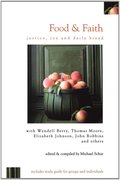
Food & Faith: Justice, Joy, and Daily Bread
Michael Shut, Ed. From the creator of the bestseller, Simpler Living, Compassionate Life: A Christian Perspective, comes Food and Faith: Justice, Joy, and Daily Bread. Food is itself a joyful gift - recall how the gift of food so often mediates the sanctity and preciousness of life. This new collection of reflections by Wendell Berry, Bill McKibben, Elizabeth Johnson, Alan Durning and others helps readers consider the moral, spiritual and economic implications of eating. Readings focus on the enjoyment and spirituality of good food, ways in which eating connects us to the land and to each other, and on the economic, environmental and cultural impacts of daily food choices. Food and Faith also includes an eight-week study guide for groups or individuals, which leads to action: setting a table that is healthy, joyful and just. (Amazon) 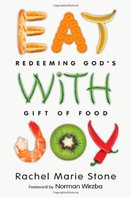
Eat With Joy: Redeeming God's Gift of Food
Rachel Marie Stone Food is the source of endless angst and anxiety. We struggle with obesity and eating disorders. Reports of agricultural horror stories give us worries about whether our food is healthy, nutritious or justly produced. It's hard to know if our food is really good for us or for society. Our relationship with food is complicated to say the least. But God intended for us to delight in our food. Rachel Stone calls us to rediscover joyful eating by receiving food as God's good gift of provision and care for us. She shows us how God intends for us to relate to him and each other through food, and how our meals can become expressions of generosity, community and love of neighbor. Eating together can bring healing to those with eating disorders, and we can make wise choices for sustainable agriculture. Ultimately, redemptive eating is a sacramental act of culture making through which we gratefully herald the feast of the kingdom of God. Filled with practical insights and some tasty recipes, this book provides a Christian journey into the delight of eating. Come to the table, partake of the Bread of Life—and eat with joy. (Amazon) 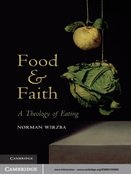
Food and Faith: A Theology of Eating
Norma Wirzba This book provides a comprehensive theological framework for assessing eating's significance, employing a Trinitarian theological lens to evaluate food production and consumption practices as they are being worked out in today's industrial food systems. Norman Wirzba combines the tools of ecological, agrarian, cultural, biblical, and theological analyses to draw a picture of eating that cares for creatures and that honors God. Unlike books that focus on vegetarianism or food distribution as the key theological matters, this book broadens the scope to include discussions on the sacramental character of eating, eating's ecological and social contexts, the meaning of death and sacrifice as they relate to eating, the Eucharist as the place of inspiration and orientation, the importance of saying grace, and whether or not there will be eating in heaven. Food and Faith demonstrates that eating is of profound economic, moral, and theological significance. (Amazon) |
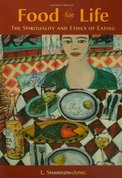
Food for Life: The Spirituality and Ethics of Eating
L. Shannon Jung Food for Life draws on L. Shannon Jung's gifts as theologian, ethicist, pastor, and eater extraordinaire. In this deeply thoughtful but very lively book, he encourages us to see our humdrum habits of eating and drinking as a spiritual practice that can renew and transform us and our world. In a fascinating sequence that takes us from the personal to the global, Jung establishes the religious meaning of eating and shows how it dictates a healthy order of eating. He exposes Christians' complicity in the face of widespread eating disorders we experience personally, culturally, and globally, and he argues that these disorders can be reversed through faith, Christian practices, attention to habitual activities like cooking and gardening, the church's ministry, and transforming our cultural policies about food. (Amazon) 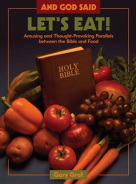
And God Said, "Let's Eat"
Gary Graf Sit back, relax, and enjoy a fascinating exploration of the power, meaning, and importance that food holds in the Scriptures. As author Gary Graf notes, "with references to everything from coriander and cinnamon to pomegranates and lamb, the Good Book could very easily be called the Food Book." In previous books in the And God Said series, Graf has illuminated the connections between sports and the Bible, but in And God Said, "Let's Eat!" he delves into a topic much closer to our hearts...and our stomachs. After all, not only were food and wine a large part of the social and religious customs of biblical times, but Jesus and the prophets often used them to explain spiritual concepts. Many of Christ's teachings and miracles involved meals, and even Christ's own mysterious gifts to humanity, his Body and Blood, are expressed in bread and wine. (Amazon) 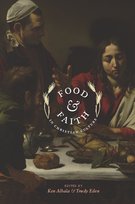
Food & Faith in Christian Culture
Ken Albala Without a uniform dietary code, Christians around the world used food in strikingly different ways, developing widely divergent practices that spread, nurtured, and strengthened their religious beliefs and communities. Featuring never-before published essays, this anthology follows the intersection of food and faith from the fourteenth to the twenty-first century, charting the complex relationship among religious eating habits and politics, culture, and social structure. (Amazon) |
Articles
- Food and Faith: Possibilities for Parishes - Part One (National Catholic Reporter)
- Food and Faith: Possibilities for Parishes - Part Two (National Catholic Reporter)
- Eating Our Words: Food, Faith, and Catholic Social Teaching (Patrick Carter)
- A journey through food, faith and fellowship (Our Sunday Visitor)
- Stewardship and Food Justice (Walt Sears, The Catholic Voice, Oakland Diocese)
Organizations & Websites
- The Baltimore Food & Faith Project - A project of The Center for a Livable Future to raise awareness about and find solutions to problems with the current food system in the Greater Baltimore area. "Partnering with faith communities, religious schools, and faith-based organizations, we address issues of environmental stewardship, social and economic justice, health and nutrition, hunger and community food security, and farm animal welfare."
- BountifulChurchyards.org - Encourages the use of church property to produce food for those without enough.
- Presbyterian Mission Agency - Food & Faith - Great resources and ideas about food from a Christian perspective.
- Food and Faith - A blog of the Presbyterian Hunger program, particularly looking at food justice issues.
- Food & Faith: United Methodist Women - Resources on the spiritual dimension of eating food.
Parish Ideas
|
Apply in Lent
While this topic may be applied at any time of the year, Lent is one particular opportunity because of the connection with fasting, abstinence, and people's tendency to give up certain foods during that season. Focus on this topic could help people go much deeper. |
Promote Table Blessings
Table blessings are part of our long tradition. Help your parishioners take on this practice by offering them hints and examples, as many families don't know where to start. There are many simple sung blessings for families with kids. Many books are also available with wide varieties of prayers. |
Related To
|
Food is often included as a topic in resources for voluntary simplicity.
|
Header photo by Robert S. Donovan (Creative Commons License).
